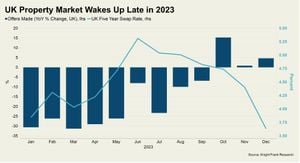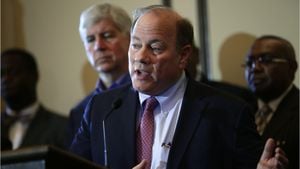HONG KONG — The annual Singles’ Day shopping festival, which is widely known as the world's largest online shopping event, seems to have lost some of its sparkle this year. This decline is largely attributed to China's struggling economy, which, according to recent reports, has pushed both consumers and businesses to rethink their spending habits. Once celebrated for its record-breaking sales, the November 11th event is now presenting challenges for major e-commerce platforms.
Alibaba, the company credited with starting this shopping extravaganza back on November 11, 2009, sought to revolutionize the way people shop online by offering enticing markdowns. The event has grown to include other platforms such as JD.com and Pinduoduo, with many retailers extending promotions well beyond the single day, beginning weeks before the event to maximize sales.
Historically, Singles’ Day served as a barometer of consumer confidence. High volume sales and ambitious spending often reflected the general mood of the purchasing populace. Now, with the dark clouds of economic uncertainty looming, consumers are showing signs of restraint. Many are facing pressures stemming from the housing market downturn and rising inflation, which have made people tighten their purse strings.
“I have only spent a few hundred yuan on daily necessities,” noted Wang Haihua, owner of a fitness center based in Beijing, reflecting this palpable shift. Wang expressed her disappointment with current e-commerce deals, stating, “They’re all tricks and we’ve seen through it over the years.” Many shoppers, like Wang, find it hard to believe the quality and prices of Singles' Day promotions remain compelling.
Another shopper, Zhang Jiewei, who runs a barber shop in Xi’an, shared similar frustrations: “I used to buy a lot two or three years ago... but since the pandemic, I’ve been more cautious.” Zhang explained his disinterest, blaming reduced income levels for his unwillingness to participate this year. “I am not going to buy anything this year,” he declared.
Experts analyzing the situation insist the recent stimulus measures enacted by Beijing have not significantly impacted consumer confidence as intended. Shaun Rein, the founder of the China Market Research Group, stated bluntly, “People are not interested in spending and are cutting back on big-ticket items. Since October 2022, everything has been on discount year-round.” With the slowdown of economic growth, it appears consumers no longer regard Singles' Day as their last chance for deep discounts.
Interestingly, as the luxury market falters, consumer preferences appear to be shifting. Categories like sportswear and fitness goods seem to maintain momentum as customers are swapping higher-end items for more practical alternatives. “There’s been a clear shift toward experiences, hobbies, and health,” Jacob Cooke, CEO of e-commerce consultancy WPIC Marketing + Technologies, explained. He noted some premium brands are still seeing good sales amid the changing market dynamics.
Despite this apparent shift, hard financials indicate trouble for many e-commerce platforms. Platforms like JD.com and Alibaba, which once shared their transaction value figures annually, have since ceased this practice, hinting at the potential decline. According to estimates by Syntun, gross merchandise sales across major e-commerce platforms grew by only 2% last year, reaching just 1.14 trillion yuan ($156.40 billion) after years of double-digit growth pre-COVID-19.
Merchants typically participating in the festival are also reporting disappointing returns on investments. Zhao Gao, who owns a garment factory, remarked, “The platforms have so many rules for promotions and customers have become more skeptical.” Many suppliers feel the high advertising costs outweigh the benefits, with sales returning only to break-even or low profits.
Du Baonian, who operates a food company specializing in mutton, noted this year his sales dropped by 15% compared to last year. He still takes part as he hopes advertising can maintain his visibility even as actual sales decline. “We are seeing shrinking revenue... but advertisement on the platform can help us maintain our leading sales position,” Du said, contemplating the need for broader advertising strategies across platforms.
Overall, the once-magnificent Singles’ Day festival appears to be flickering amid China’s economic trials and changing consumer attitudes. With consumers increasingly savvy to marketing tactics, the e-commerce world may need to recalibrate its strategies for engaging shoppers, or risk losing their attention altogether.



